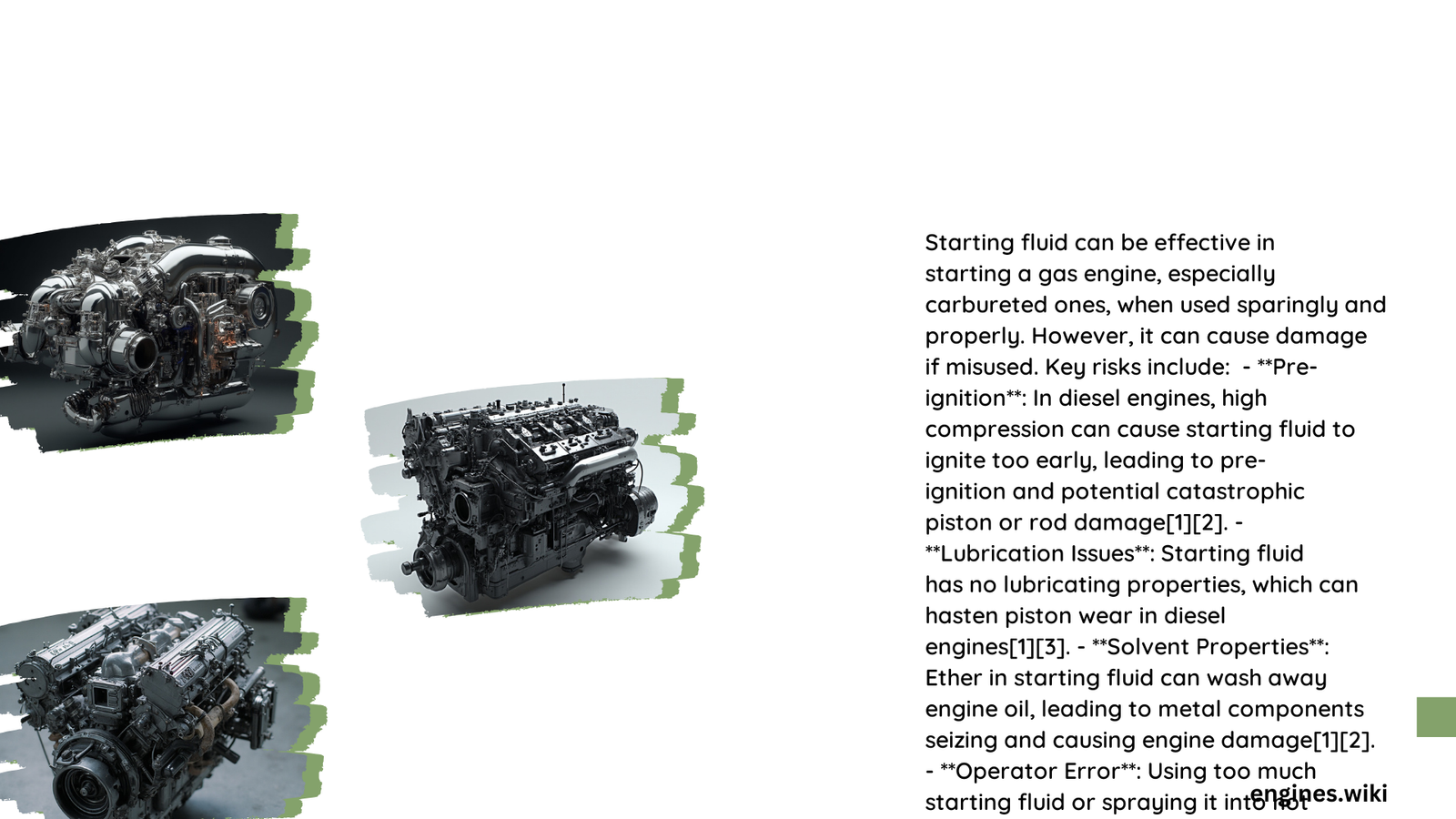Starting fluid, a volatile substance used to aid in starting engines, particularly in cold weather, can potentially harm gas engines if misused or overused. While it can be an effective tool for starting stubborn engines, its chemical composition and application method can lead to various issues. This article explores the potential risks and impacts of starting fluid on gas engines, providing insights into its proper use and alternatives.
What is the Chemical Composition of Starting Fluid?
Starting fluid typically contains a mixture of volatile hydrocarbons and propellants. The main components include:
- Heptane and petroleum distillates (70-80%)
- Diethyl ether (15-20%)
- Propellants like carbon dioxide, butane, or propane
This composition makes starting fluid highly flammable and effective for engine ignition, but it also poses potential risks to engine components.
How Can Starting Fluid Damage Engine Components?

Starting fluid can potentially harm engine components in several ways:
-
Lack of Lubrication: Starting fluid does not provide any lubrication to engine parts, which can lead to increased wear on piston rings and cylinder walls.
-
Solvent Action: The hydrocarbons in starting fluid can strip away residual oil from engine components, exacerbating the lack of lubrication.
-
Corrosive Effects: While not directly corrosive, the solvent properties of starting fluid can indirectly lead to corrosion by removing protective oil layers.
| Engine Component | Potential Damage |
|---|---|
| Piston Rings | Increased wear, reduced compression |
| Cylinder Walls | Scoring, increased friction |
| Valves | Potential sticking or burning |
Does Starting Fluid Affect Combustion Efficiency?
Starting fluid can temporarily improve combustion efficiency by providing an easily ignitable mixture. However, it does not have a lasting impact on the engine’s performance:
- It does not alter the air-fuel ratio in a sustainable way
- Combustion temperatures are not significantly changed
- Once the starting fluid is consumed, the engine returns to its normal operating conditions
Which Engine Types are Most Affected by Starting Fluid?
Starting fluid can affect different engine types in various ways:
- Carbureted Engines: More commonly used and generally less risky
- Fuel-Injected Engines: Less recommended due to potential damage to sensors and injectors
- Two-Stroke Engines: Most susceptible to damage due to their reliance on oil mixed with fuel for lubrication
- Diesel Engines: Can be particularly risky, especially those with preheat systems, due to the potential for pre-ignition and severe engine damage
What are Common Misuse Scenarios for Starting Fluid?
Misuse of starting fluid can lead to several issues:
- Overuse: Excessive use can wash away oil from cylinder walls, leading to increased wear.
- Use in Warm Engines: Applying starting fluid to an already warm engine can cause pre-ignition and potential engine damage.
- Improper Application: Spraying too much or in the wrong location can lead to uneven combustion or damage to sensors.
Are There Viable Alternatives to Starting Fluid?
Several alternatives can be considered for starting gas engines:
- Block Heaters
- Cost: Higher initial investment
- Accessibility: Widely available, may require professional installation
-
Effectiveness: Highly effective in cold weather, reduces engine wear
-
Remote Starters
- Cost: More expensive than starting fluid
- Accessibility: Widely available, may require professional installation
-
Effectiveness: Improves starting efficiency without chemical risks
-
Fuel Additives
- Cost: Generally less expensive than mechanical solutions
- Accessibility: Widely available
- Effectiveness: Can improve cold-weather starting, but may not be as reliable as other methods
How to Properly Use Starting Fluid?
If you choose to use starting fluid, follow these guidelines to minimize potential harm:
- Use sparingly and only when necessary
- Follow manufacturer’s instructions carefully
- Avoid use in diesel engines with glow plugs or preheat systems
- Never use in two-stroke engines unless specifically designed for them
- Ensure proper ventilation when using
What are the Long-Term Effects of Starting Fluid on Gas Engines?
Long-term use of starting fluid can potentially lead to:
- Increased wear on piston rings and cylinder walls
- Reduced engine compression
- Potential damage to fuel system components in fuel-injected engines
- Increased likelihood of pre-ignition or detonation
While occasional use is unlikely to cause significant harm, regular reliance on starting fluid can contribute to premature engine wear and potential failure.
In conclusion, while starting fluid can be an effective tool for starting stubborn engines, its potential to harm gas engines makes it important to use cautiously and sparingly. Consider alternatives like block heaters or proper engine maintenance to avoid the need for starting fluid altogether. If you must use starting fluid, follow manufacturer guidelines and be aware of the potential risks to your engine’s longevity and performance.
